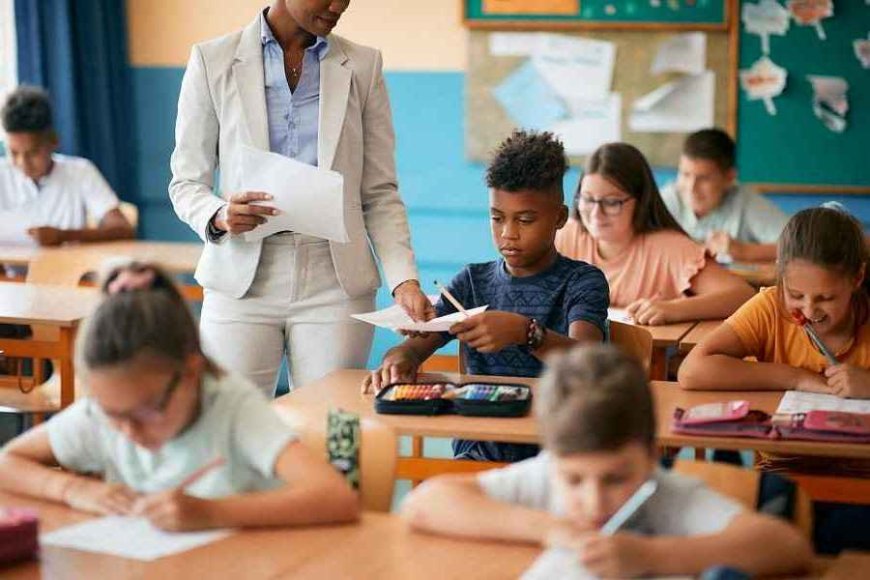Exploring Alternative Assessment Methods for Comprehensive Learning
This article delves into the world of alternative assessment methods, shedding light on their significance in fostering deeper

In the realm of education, assessment is an indispensable tool for evaluating student progress and understanding. Traditionally, assessments have been associated with standardized tests and written examinations. However, the landscape of education is evolving, and educators are increasingly recognizing the limitations of conventional assessment methods. This article delves into the world of alternative assessment methods, shedding light on their significance in fostering deeper understanding, critical thinking, and holistic learning experiences.
Understanding Alternative Assessment Methods
Alternative assessment methods encompass a diverse array of techniques that differ from traditional tests and exams. These methods aim to measure not only a student's knowledge but also their ability to apply, analyze, and synthesize information. Emphasizing skills like critical thinking, problem-solving, and creativity, alternative assessments provide a more nuanced understanding of a student's abilities and potential.
The Role of Performance-Based Assessments
Performance-based assessments are a cornerstone of alternative assessment methods. These assessments require students to demonstrate their understanding through real-world tasks and projects. Whether it's presenting a research project, creating a portfolio, or engaging in hands-on activities, performance-based assessments offer a comprehensive view of a student's learning journey. By applying their knowledge to practical situations, students develop a deeper understanding of the subject matter.
Project-Based Learning: Bridging Theory and Application
Project-based learning is an innovative approach that aligns seamlessly with alternative assessment methods. It involves students in designing and executing projects that address real-world challenges. The process encourages collaboration, critical thinking, and problem-solving. Through projects, students not only master content but also develop skills such as time management, communication, and adaptability - all of which are essential for success beyond the classroom.
Portfolios: A Window into Growth
Portfolios are another avenue for alternative assessment. A portfolio is a collection of a student's work that demonstrates their progress and growth over time. It can include essays, projects, artwork, and reflections. Portfolios provide a holistic view of a student's capabilities and allow educators to assess how well they can apply their learning to different contexts. Moreover, portfolios encourage metacognition, as students reflect on their learning journey and set goals for improvement.
Authentic Assessments: Contextualizing Learning
Authentic assessments replicate real-world scenarios, allowing students to apply their knowledge in meaningful contexts. For example, a science assessment might involve designing and conducting an experiment, while a language arts assessment could entail writing a persuasive essay on a current social issue. These assessments not only measure subject mastery but also prepare students for challenges they might encounter in their future careers.
Peer and Self-Assessment: Fostering Responsibility
Peer and self-assessment are valuable components of alternative assessment methods. Encouraging students to assess their own work and that of their peers nurtures a sense of responsibility and accountability. It also promotes metacognition, as students evaluate their strengths and areas for improvement. Peer feedback enhances communication and analytical skills, while self-assessment cultivates a reflective and independent approach to learning.
Embracing Technology: Digital Assessments
In the digital age, technology offers new avenues for alternative assessments. Online platforms allow students to create multimedia presentations, interactive quizzes, and simulations. These assessments engage students with varied learning styles and offer immediate feedback. Additionally, digital assessments can be customized to adapt to each student's pace and level of understanding, promoting personalized learning experiences.
Challenges and Considerations
While alternative assessment methods offer numerous benefits, they also present challenges. Designing and evaluating these assessments can be time-consuming, and standardizing the grading process might be more complex. Moreover, ensuring that alternative assessments align with curriculum objectives and educational standards requires careful planning and collaboration among educators.
Inclusive Assessment: Addressing Diverse Learners
Alternative assessment methods are inherently inclusive, catering to diverse learning styles and abilities. Traditional exams may disadvantage students who excel in practical applications or creative endeavors. Alternative assessments provide an opportunity for every student to showcase their strengths, fostering a sense of accomplishment and boosting self-esteem.
A Shift in Mindset: Educator's Role
The adoption of alternative assessment methods necessitates a shift in the educator's role. Teachers become facilitators of learning, guiding students through projects, discussions, and self-assessment processes. This role transformation emphasizes mentorship, individualized guidance, and the cultivation of 21st-century skills.
The Broader Impact: Preparing Future-Ready Citizens
Alternative assessment methods go beyond measuring subject knowledge; they prepare students to be future-ready citizens. By emphasizing critical thinking, problem-solving, collaboration, and self-assessment, these methods equip students with skills that are essential for success in a rapidly changing world. These skills transcend academic disciplines and empower students to approach challenges with creativity and resilience.
Conclusion: Pioneering the Way Forward
As education evolves to meet the demands of the 21st century, alternative assessment methods emerge as a powerful means of evaluating student learning and development. By shifting the focus from rote memorization to application, analysis, and creativity, these methods empower students to become active participants in their learning journey. While challenges exist, the potential for fostering holistic learning experiences and preparing future-ready citizens makes the pursuit of alternative assessment methods a worthy endeavor for educators and institutions alike.
